#modeling agency WordPress theme
Explore tagged Tumblr posts
Text
Why Choose the Modelling WordPress Theme to Elevate Your Professional Image Online?
Whether you're a model, photographer, stylist, or talent agent, your website should do more than just look good—it should represent your brand, engage visitors, and open doors. The Modelling WordPress theme delivers exactly that with its clean, powerful, and image-centric design.
Here's why this template stands out in the crowded world of fashion and modeling websites.
A First Impression That Captivates
You never get a second chance to make a first impression—especially in fashion. This theme features full-width hero images, fluid animations, and minimalist typography that exude professionalism and sophistication from the very first scroll.
Whether it's a personal website or a modeling agency WordPress theme, Modelling sets the tone for luxury and credibility.
Build a Standout Portfolio
At its core, the theme revolves around showcasing visuals. Use it to build:
Model headshot portfolios
Campaign showcases
Event photo collections
Test shoot albums
Polaroid-style galleries
With customizable gallery styles, hover effects, and animation options, your work will command attention.
WooCommerce Ready for Selling Services or Products
Want to monetize your brand further? This template is fully compatible with WooCommerce, letting you sell:
Print packages
Digital lookbooks
Merch or modeling gear
Membership content or booking slots
It’s more than just a site—it’s a storefront for your modeling business.
Versatile Design for Agencies and Freelancers
From freelance models and photographers to full-service fashion agencies, the theme’s multipurpose layout adapts to your specific needs. Key built-in templates include:
About Me/Us pages
Contact and Booking forms
Team member grids
Client testimonials
Pricing tables and services
Everything is tailored to the beauty and fashion industries.
Blogging and Content Marketing Tools
Use the blog to tell your story, offer fashion insights, or publish behind-the-scenes content. Not only does this engage visitors—it also improves search engine rankings.
Combine your stunning visuals with strategic storytelling to dominate both Google and your audience's hearts.
Optimized for All Devices and Browsers
The world of modeling is global. Whether your site is viewed from Paris, New York, or Tokyo, it needs to load fast and look flawless. This responsive modeling WordPress theme guarantees consistent performance across all screen sizes and modern browsers.
Enhance Credibility with Testimonials and Press Features
Testimonials from photographers, designers, or clients help build credibility. This theme allows you to feature reviews, press logos, and awards right on your homepage or dedicated pages—turning curiosity into trust and trust into action.
Final Thoughts
From high-fashion creatives to freelance models and agencies, the Modelling WordPress theme offers the perfect blend of elegance, flexibility, and business functionality. It’s more than just a beautiful face—it’s a hardworking digital portfolio designed to elevate your brand, attract clients, and grow your presence online.
#model WordPress theme#fashion model website template#modeling agency WordPress theme#model portfolio WordPress site#runway model website theme#glamour model WordPress template#fashion industry WordPress theme#celebrity portfolio WordPress site#fashion show WordPress template#model bio WordPress theme#photoshoot showcase WordPress site#fashion blog WordPress template#model talent WordPress website#high fashion WordPress theme#style influencer WordPress site#fashionista WordPress template#male model WordPress theme#female model website template#fashion magazine WordPress theme#modeling career WordPress site
0 notes
Text
Unlocking Digital Success: Why You Should Hire a Dedicated Development Team for Full-Stack Web Solutions

In today’s hyper-digital era, businesses of all sizes are under constant pressure to innovate, optimize, and expand their online presence. Whether you're launching a new product, scaling your eCommerce business, or upgrading an outdated website, partnering with a reliable full stack software development company can make all the difference. Among the smartest choices you can make is to hire a dedicated development team that aligns perfectly with your vision and technical needs.
Why Hire a Dedicated Development Team?
Hiring a dedicated development team gives you access to a pool of highly skilled professionals who focus solely on your project. Unlike freelancers or in-house staff with multiple roles, dedicated teams work as an extension of your organization—streamlining communication, accelerating timelines, and ensuring consistent quality.
These teams are flexible and scalable. Whether you need just a few developers or an entire squad of frontend, backend development services, UI/UX designers, and testers, you can assemble a customized team that evolves with your project. This model is cost-effective and reduces overhead related to recruitment, onboarding, and infrastructure.
WordPress Website Development Agency: Powering Your Digital Identity
For businesses looking to build a powerful yet manageable online platform, a WordPress website development agency is a go-to solution. WordPress powers over 40% of the internet, making it the most popular content management system (CMS) in the world. Professional agencies provide services that go beyond basic themes—they build custom plugins, optimize SEO, and integrate eCommerce platforms like WooCommerce.
These agencies understand the intricacies of WordPress architecture and help tailor your site to reflect your brand’s voice, ensure mobile responsiveness, and secure your platform from vulnerabilities.
The Power of Backend Development Services
The frontend might be what users see, but it’s the backend that drives functionality, security, and performance. Investing in robust backend development services ensures your application runs smoothly behind the scenes. From database management and API integrations to server-side logic and cloud hosting, skilled backend developers create the backbone of scalable and secure web applications.
With the rise of technologies like Node.js, Laravel, Django, and Python, backend development has become more dynamic than ever. A professional team ensures that your app or site handles user requests efficiently and stays protected against common security threats.
Full Stack Software Development: One-Stop Digital Solutions
When you partner with afull stack software development company, you get end-to-end solutions—from concept and design to development and deployment. Full stack developers handle both the frontend and backend, ensuring cohesive functionality and design across all touchpoints. This not only reduces the risk of miscommunication between frontend and backend teams but also speeds up development cycles.
Such companies often follow agile methodologies, allowing for quick iterations, transparency, and regular feedback. They can work on various platforms—be it mobile apps, web applications, or complex enterprise solutions.
Final Thoughts
Whether you need a custom WordPress website, scalable backend infrastructure, or a comprehensive full stack solution, choosing tohire a dedicated development team is a strategic move. It brings expertise, efficiency, and flexibility to your project while freeing you to focus on your core business goals. As digital competition heats up, make sure you’re powered by the right team to stay ahead.
0 notes
Text
Best Web Development Company in Dubai: How to Spot the Real Experts
There are plenty of agencies that claim to build websites. But building a great website? One that doesn’t just load fast but drives conversions, scales smoothly, ranks well, and earns its ROI every single month? That’s a different game.
In Dubai’s competitive digital scene, where everyone is shouting about innovation and next-gen tech, it can be hard to tell who really knows their stuff from who’s just good at making pitch decks.
So, if you’re a business owner, marketer, or decision-maker trying to vet your options, here’s a practical guide to spotting the real experts.
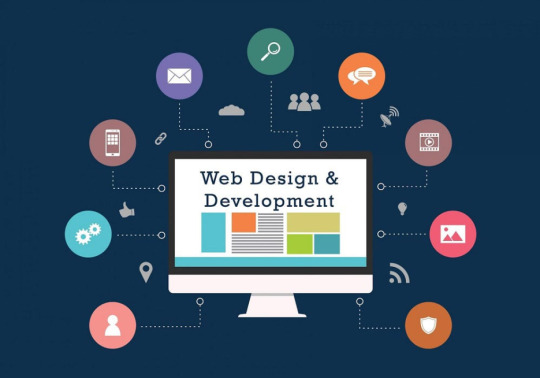
1. Strategy First, Not Templates
This is the single biggest red flag: if an agency opens the conversation with colour palettes, logo placements, or how many pages you need, stop them right there.
The best firms begin with questions like:
What’s your business model?
What does success look like for your site?
Who is your audience and what do they struggle with?
They’re not trying to sell you a design. They’re solving a problem.
This is exactly why clients working with a digital marketing company in Dubai often see better long-term results, because strategy and site design are treated as inseparable.
2. Tech Stack Isn’t One-Size-Fits-All
Real experts don’t force-fit your business into the same WordPress theme they’ve used for 50 other clients. They match the tools to your needs.
That could mean:
A fast static site for an info-heavy SaaS business
A scalable Shopify Plus setup for a global e-commerce store
A custom Laravel backend for enterprise operations
Good developers can explain why they’re choosing a stack, what its tradeoffs are, and how it will grow with you.
3. Real Projects, Not Mockups
Always ask to see live URLs of recent work, not just a Behance portfolio or screenshots.
Then dig deeper:
What was the goal of this site?
What problem did you solve?
What results came from it?
If they can’t speak confidently to the journey, the obstacles, and the outcomes, it’s likely they were only involved in design or frontend.
Experts love to talk shop. Their eyes light up when they walk you through a project they’re proud of.
4. Clear Process with Milestones
Professionals don’t wing it. They have frameworks.
From kickoff to launch, the process should look something like this:
Discovery & Requirements
UX Research & Wireframes
Visual Design
Development & Testing
SEO Setup & Analytics
Launch + Post-launch Support
At each stage, you should know:
Who’s doing what
What tools they’re using
What feedback they need
If someone says they can do it all in 10 days with a couple of Zoom calls, run.
5. Post-Launch Isn’t a Goodbye
Websites are living assets. They require ongoing updates, performance reviews, A/B testing, and tech upkeep.
Real agencies build in long-term support plans. These might include:
Monthly performance reviews
Security patches and plugin updates
UX optimization based on heatmaps
This long-view approach is exactly what separates solid dev partners from disposable freelancers. And it’s why businesses who hire teams offering digital marketing services in UAE often stick with them for years.
6. Results Over Awards
Sure, it’s nice if a firm has won a few design awards. But that doesn’t mean much unless those sites are ranking, converting, and helping businesses grow.
Look for agencies who measure:
Bounce rate reductions
Conversion lifts
Lead form submissions
Load time improvements
Because at the end of the day, your website needs to drive business, not just look good in a trophy case.
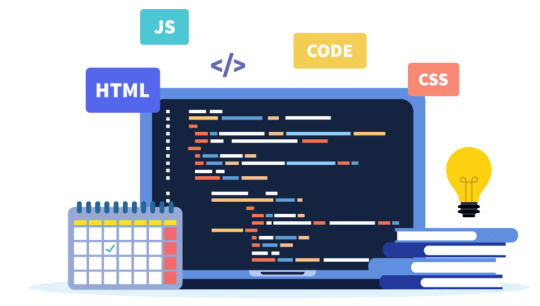
7. Client Education Is Baked In
Top-tier developers don’t just hand off a CMS login and disappear. They:
Train your team
Record walkthroughs
Document admin panels
Offer clear change logs
They want you to be confident using the site. Because educated clients make better decisions, and better decisions lead to better outcomes.
This is why those looking for affordable digital marketing services Dubai value education alongside execution.
8. Communication Is Consistent, Clear, and Human
You should never feel like you’re chasing updates or decoding jargon.
Great agencies:
Assign a project manager
Use shared boards (Asana, ClickUp)
Hold weekly check-ins
Summarise progress clearly
And here’s a bonus tip: notice how they respond in the sales process. That’s the best preview of what working together will feel like later.
9. They Talk SEO Early and Often
SEO isn’t a plugin you tack on at the end. It’s embedded into architecture, content, and page speed.
Experts will:
Plan site structure for indexability
Set up schema markup
Compress images for performance
Configure 301s, not just leave broken links
This holistic approach is common among teams known as the best digital marketing company in Dubai, who understand that SEO starts before a single line of code is written.
10. They Say No (Sometimes)
Yes-men will let you walk into bad decisions. Experts will push back when needed.
They might say:
“This feature is too heavy for mobile.”
“That plugin will slow your site down.”
“You don’t need that custom dev, here’s a smarter solution.”
They’re not trying to win you over with flattery. They’re trying to protect your time, budget, and future headaches.
And that’s priceless.
Red Flags to Watch For
If you see these, pause:
Overly generic proposals
No mention of analytics or SEO
Everything runs through a single freelancer
No real project timeline
A quote that sounds too cheap to be true
Web development isn’t a commodity. It’s a business tool. And like any tool, you get what you pay for.
Questions to Ask Before You Sign Anything
Here’s your shortlist:
Can I see three live projects you’ve launched in the past year?
What happens if the project goes over scope or deadline?
Will I own my code, assets, and hosting?
How do you handle mobile optimization?
What’s your post-launch support plan?
And most importantly: 6. Can you walk me through a recent client challenge you solved and what the outcome was?
If they’re vague or deflect, you’ve got your answer.

The Bottom Line
In a city like Dubai, where competition is intense and attention spans are short, your website is your sharpest tool.
But that tool is only as good as the hands that built it.
Working with real experts means you’re not just getting a site that loads. You’re getting a site that sells, scales, and adapts to the fast pace of your industry.
So, take your time. Ask the hard questions. Look past the pretty visuals and dig into the process.
And if you want a team that ticks all these boxes—strategy, SEO, security, support—start with those offering proven digital marketing services in UAE. Because great web development isn’t just about tech. It’s about trust.
That’s how you spot the real experts.
#best web development Dubai#expert developers UAE#Dubai tech agencies#digital marketing company in Dubai#web services 2025#affordable digital marketing services dubai#best digital marketing company in dubai#digital marketing services in uae#digital marketing#digitalmarketinguae#digital marketing dubai#seo#ai
0 notes
Text
Not every fitness model has a six-pack. And not every lifestyle model lives in the gym. In fact, some of the most in-demand talent right now are real people – those who look like the rest of us, wear fitness gear, enjoy movement, and live everyday lives. If you're someone who enjoys staying active or simply wants to get started, modelling might be a path for you. Fitness and lifestyle modelling is open to adults of all shapes, sizes, and backgrounds – whether you're into high-intensity training, walking your dog, or just pulling on gym leggings for comfort. Brands are looking for models who feel confident in their own skin. Whether you’re toned, curvy, slim, stocky, or anywhere in between, there are opportunities for you to be seen. Fitness brands sell more than just gym clothes – they promote connection, wellbeing, and relatable stories. At Models Direct, we encourage all aspiring models to showcase themselves authentically. Snap photos in sportswear. Show a reel of you working out or doing an everyday activity. Let your personality shine. Lifestyle modelling is just as powerful. This could mean portraying a retail shopper, a healthcare worker, or someone enjoying a morning run. Think real, relatable and natural. Top tips to stand out: Build a portfolio with sports and lifestyle-themed photos. Capture interactions – like chatting with a friend or working in a casual setting. Submit a short reel to show confidence in action. Join a modelling agency like ours to connect with brands directly. Fitness and lifestyle modelling isn’t about perfection. It’s about presence, attitude and representation. And as more brands look to reflect real people in real settings, now is the perfect time to be seen. Find out how to apply and get started today. #fitnessmodelling #lifestylemodelling #modellingagency #becomemodel #realmodels #modelswanted #inclusivemodelling #sportswearshoot #modelsearch #modellingconfidence #modellingforbeginners #modelsdirect

View On WordPress
0 notes
Text
A Practical Guide to Ecommerce Development: WordPress, Shopify, and Choosing the Right Services
Digital commerce has become essential for businesses of all sizes. Whether starting small or managing a growing catalog of products, having a reliable, scalable, and easy-to-manage ecommerce setup is critical. But with multiple platforms and service models available, selecting the right path can be challenging.
This article explores three key areas of focus in the ecommerce space: ecommerce development services, WordPress development services, and the value of working with a Shopify development agency. Understanding the strengths, limitations, and suitable use cases for each helps businesses make decisions based on actual needs—not trends.
What Do Ecommerce Development Services Include?
Ecommerce development services refer to the technical planning, construction, and support of an online store. This includes setting up platforms like WooCommerce or Shopify, configuring product categories, managing payment gateways, and ensuring mobile responsiveness.
Core Components of Ecommerce Development
Platform Setup Depending on the product range and business model, developers set up platforms such as WordPress, Shopify, or Magento.
Design and User Interface A structured layout, easy navigation, and responsive design improve the overall user experience and conversion rates.
Product and Inventory Management Services often include integration with inventory systems, setting up variants, attributes, and real-time stock tracking.
Payment and Checkout Integration Secure, smooth payment gateways and easy checkout experiences reduce cart abandonment.
Shipping Configuration Ecommerce services also include linking with logistics providers, calculating real-time rates, and handling multi-location shipping needs.
Analytics and Tracking Integration with Google Analytics or custom dashboards provides data on sales performance and customer behavior.
Security and Maintenance SSL setup, regular updates, and monitoring ensure the site remains safe and operational at all times.
Who Needs These Services?
From first-time store owners to established retailers looking to scale, ecommerce development services are useful for businesses that:
Want to build a new store from scratch
Need to migrate platforms
Plan to customize existing functionality
Require integration with third-party apps or internal systems
WordPress Development Services for Ecommerce
WordPress is widely known as a content management system, but with the WooCommerce plugin, it also serves as a full-fledged ecommerce platform. Its open-source structure and wide plugin ecosystem make it a flexible option for businesses with specific design or content needs.
What WordPress Development Services Typically Cover
WooCommerce Setup Installation, configuration, and customization of the WooCommerce plugin to manage products, payments, and shipping.
Custom Theme Development Creating themes from scratch or modifying existing ones to align with business identity and layout requirements.
Plugin Integration Extending functionality using plugins for SEO, customer support, analytics, and more.
Site Performance Optimization Image compression, caching tools, and lazy loading for faster page loads.
Security and Backup Adding security plugins, SSL setup, and backup scheduling to keep the site protected.
Content Structure Managing posts, pages, and taxonomy to ensure consistent user experience across blog and product areas.
Advantages of Using WordPress for Ecommerce
Flexibility: Offers full control over design and backend code
Community Support: Thousands of themes, plugins, and developer communities
Cost Control: Hosting and development can be scaled based on budget
Content Focused: Ideal for businesses that balance ecommerce with content (e.g., magazines with online shops)
Points to Consider
Requires separate hosting
Maintenance and updates are manual or plugin-dependent
Some technical learning required if managed in-house
Businesses that need a blend of content management and product selling—especially with multiple product types or frequent blog updates—often choose WordPress development services.
The Role of a Shopify Development Agency
Shopify is a hosted ecommerce platform focused entirely on product-based selling. With built-in hosting, security, and user-friendly tools, it’s often preferred by businesses that want a fast setup and minimal technical maintenance.
A Shopify development agency specializes in creating, customizing, and managing Shopify stores to meet the specific needs of clients.
Typical Services Offered by a Shopify Development Agency
Store Setup Product import, category organization, and basic Shopify configuration.
Theme Customization Modifying existing themes or creating custom ones using Liquid, Shopify’s templating language.
App Integration Connecting third-party apps for reviews, loyalty programs, subscriptions, or advanced analytics.
Custom Functionality Adding advanced features such as dynamic pricing, multi-location inventory, or product bundling.
Store Migration Transferring existing stores from platforms like WooCommerce, Magento, or Wix to Shopify without losing data or SEO ranking.
Ongoing Support Updates, bug fixes, UX improvements, and data reporting.
When to Choose Shopify
Quick launch timelines
Limited technical resources in-house
Need for scalable infrastructure without hosting concerns
Preference for predictable monthly costs
Focused solely on product selling (vs. content or membership sites)
For small to mid-sized businesses, or those scaling rapidly, working with a Shopify development agency ensures the store remains optimized, fast, and user-friendly.
Choosing the Right Development Partner
Whether selecting a freelancer, an internal team, or an external agency, the development partner should:
Understand your business model and growth plans
Recommend a platform based on actual requirements
Provide transparent timelines and deliverables
Offer post-launch support and performance monitoring
Be experienced in working with the platform of your choice
A balanced approach between strategy, execution, and support ensures long-term results. One such provider that handles both ecommerce development services and platform-specific solutions is webiators, known for working across WordPress and Shopify environments.
Final Thoughts
Building an ecommerce presence requires more than a platform—it requires a structure that supports long-term goals, adapts to growth, and delivers consistent performance. Whether through WordPress development services for full control, or a Shopify development agency for speed and scalability, choosing the right approach comes down to understanding your current needs and future direction.
Development services help translate business ideas into digital storefronts that not only work but grow with you—one order, one customer, and one update at a time.
0 notes
Text
Why White Label WordPress Development is in High Demand
WordPress powers over 40% of websites globally, making white label WordPress development one of the most sought-after services. If you're an agency that needs to deliver high-quality WordPress sites without the stress of hiring developers, we’ve got you covered.
Awelion provides complete white label website development, from theme customization to plugin setup and SEO configuration. Our agency website outsourcing in India model is trusted by partners in the US, UK, Australia, and beyond.
Need continuous support? We offer white label website maintenance services that include regular updates, backups, and performance monitoring.
0 notes
Text
Top 5 CMS Platforms Compared: WordPress vs. Shopify vs. Wix vs. Webflow vs. Joomla

Choosing the right Content Management System (CMS) is one of the most important decisions you’ll make when building a website. Whether you're launching an e-commerce business, a blog, a portfolio, or a full-scale enterprise site, your CMS determines not just how your website looks, but how it grows, scales, and performs.
In 2025, the CMS market is more diverse and competitive than ever. With so many options available, it's crucial to pick the platform that aligns best with your goals, technical skills, and business model.
In this article, we compare five of the most popular CMS platforms: WordPress, Shopify, Wix, Webflow, and Joomla — covering their pros, cons, ideal use cases, and pricing.
1. WordPress (.org)

Overview:
WordPress is the world’s most widely used CMS, powering over 40% of websites globally. It's open-source, highly customizable, and supported by a massive community.
Pros:
Completely free and open-source
Thousands of themes and plugins
Strong SEO capabilities with plugins like Yoast
Highly customizable for developers
Large support community and documentation
❌ Cons:
Requires separate hosting and domain purchase
Some plugins may conflict or become outdated
Security risks if not updated regularly
Best For:
Bloggers
Businesses with unique functionality needs
Agencies and developers
Pricing:
Free to use, but hosting and premium themes/plugins cost extra (typically $50–$200/year)
Verdict:
If flexibility and control matter to you, WordPress.org is a powerhouse. It’s ideal for users who want full ownership and are willing to manage their site actively.
2. Shopify
Overview:
Shopify is a CMS built specifically for e-commerce. It powers over a million online stores and provides everything you need to sell products online — from inventory to payments.
Pros:
All-in-one e-commerce platform
Built-in payment gateway and shipping options
Clean, mobile-responsive templates
Great app store and integrations
Fast, secure hosting included
❌ Cons:
Monthly subscription fees can add up
Less flexible for content-heavy, non-ecommerce sites
Limited customization unless using Shopify Plus
Best For:
Online retailers
Dropshipping businesses
Product-based startups
Pricing:
Starts at $39/month (Basic Shopify)
Additional fees for apps and premium themes
Verdict:
For e-commerce, Shopify is one of the easiest and most scalable platforms to get started with. It’s perfect for businesses that want to focus on selling, not coding.
3. Wix
Overview:
Wix is a drag-and-drop website builder that simplifies the process of creating attractive, functional websites without writing any code.
Pros:
Easy-to-use visual editor
Large selection of design templates
Built-in SEO tools and analytics
Affordable plans with hosting included
Wix ADI (Artificial Design Intelligence) speeds up design
❌ Cons:
Limited flexibility for advanced customizations
Once a template is selected, it can’t be changed
Not ideal for large or complex sites
Best For:
Freelancers and solopreneurs
Small service businesses
Artists, photographers, and content creators
Pricing:
Free basic plan (with Wix ads and subdomain)
Premium plans start at $16/month
Verdict:
Wix is perfect for users who value simplicity and speed over advanced features. If you want to get online quickly with minimal effort, Wix is a great option.
4. Webflow
Overview:
Webflow is a modern, designer-friendly CMS that combines the power of custom code with the ease of a visual editor. It's ideal for building pixel-perfect, professional websites.
Pros:
Visual editor with full HTML/CSS control
Great for animations and interactions
Clean, modern templates
Built-in CMS and e-commerce options
SEO-friendly with clean code structure
❌ Cons:
Steeper learning curve than Wix or Shopify
Pricing is higher for CMS and e-commerce features
Requires basic web design knowledge
Best For:
Designers and creative agencies
Tech-savvy entrepreneurs
Businesses needing custom design without full development
Pricing:
Site plans start at $14/month (Basic) and $29/month (CMS)
E-commerce plans from $42/month
Verdict:
If visual design is your priority and you have some web experience, Webflow gives you professional control and creativity unmatched by simpler CMS platforms.

5. Joomla
Overview:
Joomla is another open-source CMS similar to WordPress, but with more advanced built-in functionality. It's used by developers and organizations that need more flexibility and user control.
✅ Pros:
Open-source and free to use
More robust user permission control
Great for multilingual websites out of the box
Flexible content structure and layouts
❌ Cons:
Steeper learning curve than WordPress
Smaller community and plugin ecosystem
Not beginner-friendly
Best For:
Developers and tech-savvy users
Government, educational, and enterprise sites
Sites requiring multiple user roles and languages
Pricing:
Free core software, but you’ll need to pay for hosting, templates, and extensions
Verdict:
Joomla is a solid choice for users with development experience or unique content requirements. It's not for beginners but offers great power and control for the right audience.
Final Thoughts
When choosing a CMS, there’s no one-size-fits-all answer. Each platform shines in different areas. Here’s a quick summary to guide your decision:
Choose WordPress if you want full flexibility and access to the largest ecosystem.
Choose Shopify if your focus is e-commerce and you want an all-in-one solution.
Choose Wix for simple, fast website creation without technical complexity.
Choose Webflow if you care deeply about design and want pixel-level control.
Choose Joomla if you need robust content management and multilingual support.
Your ideal CMS will depend on your goals, budget, technical skill, and future growth plans. Invest time in exploring demos, community feedback, and use cases — and you'll find the perfect platform to bring your digital vision to life.
#CMSComparison#WordPress2025#ShopifyEcommerce#WixWebsite#WebflowDesign#JoomlaTips#WebsiteDevelopment#CMSReview#StartupWebTools#OnlineBusiness2025
0 notes
Text
Agencies vs Freelancers: Who Wins in Mobile-First WordPress Optimization?

In 2025, mobile-first WordPress optimization will become essential for site performance and user retention. A mobile-first design ensures your WordPress site loads fast, adapts to screen sizes, and maintains usability across all devices.
More than 59% of global website traffic comes from mobile devices, making performance optimization a non-negotiable factor. Optimizing a WordPress site for mobile goes beyond responsive design. It includes mobile WordPress speed optimization, asset compression, minimal code render-blocking, and effective caching setups via WordPress development tools.
But who should handle your optimization?
You have two options
agencies with structured workflows or
freelancers with flexible engagement models.
Each approach brings a different perspective to hiring WordPress developers, and each impacts delivery, scalability, and speed in distinct ways. But the real question is:
Which one ensures better results for mobile-first WordPress optimization?
This blog compares both models side by side to help you decide what works best for your WordPress performance goals!
What is Mobile-First WordPress Development?
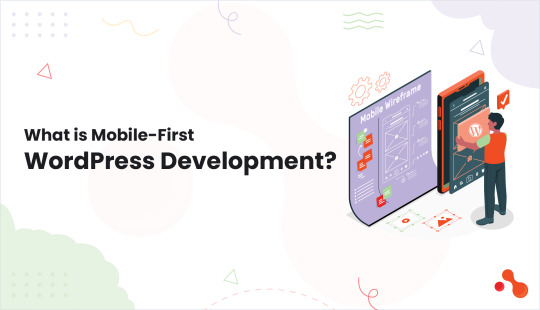
Mobile-first WordPress development means building the mobile version of your site before the desktop version. It prioritizes loading speed, clean UI, and responsive interactions for smaller screens.
In WordPress, this starts with choosing a responsive theme and optimizing the layout to load critical mobile content first. Developers then enhance performance using techniques like image compression, lazy loading, and asynchronous scripts.
Why does this matter?
Mobile WordPress speed optimization directly affects user engagement and bounce rate. If your mobile site loads in over three seconds, most users leave.
Core Benefits of Mobile-First WordPress Development
Faster load times improve session duration and reduce bounce
Improved SEO performance, since Google prioritizes mobile-first indexing
Better user experience (UX) with simpler navigation and touch-first design
These benefits only work if the technical foundation supports them. That’s where key performance metrics come in.
Key Metrics for Performance Evaluation
LCP (Largest Contentful Paint): Measures how quickly the main content loads
CLS (Cumulative Layout Shift): Tracks how stable the layout remains during load
TTI (Time to Interactive): Gauges how fast a user can engage with content
Mobile PageSpeed Score: Google’s score based on technical and UX performance
Freelancers and agencies approach these metrics differently. The next section will show how.
Why Performance Optimization Matters in Mobile-First?
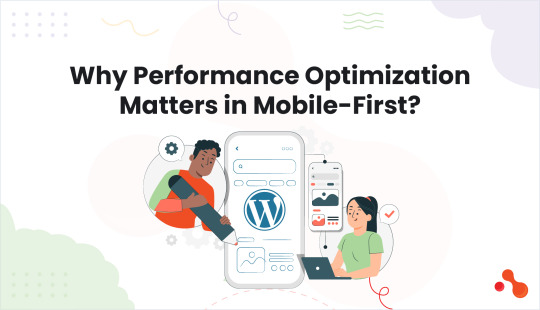
In a mobile-first world, performance optimization drives both visibility and conversions. Google now uses mobile-first indexing by default, meaning it evaluates your site’s mobile version before the desktop version.
If your WordPress site performs poorly on mobile, it won’t rank, regardless of how strong your desktop version looks. This is where mobile-first WordPress optimization makes a measurable difference.
Mobile Performance = SEO Performance
Google’s Core Web Vitals LCP, CLS, and TTI are major ranking factors.
A slow-loading mobile page fails these metrics and drops in search results.
Also, a poor mobile WordPress speed optimization strategy directly impacts the PageSpeed score, which lowers ranking potential further. A trustworthy WordPress website development company would help you solve the complications well!
Mobile Bounce Rates Are Brutal
Studies show that mobile users are 32% more likely to bounce than desktop users when a site is slow or unstable. If your mobile site loads in over three seconds, 53% of users abandon it before interacting.
What Poor Optimization Looks Like on Mobile?
Fonts are too small or hard to tap
Layout shifts while loading
Unoptimized images are slowing the page
Mobile menus failing on tap
Content blocked by interstitials or banners
Delays in response after a click
Whether you hire WordPress developers via an agency or freelance, their ability to handle these issues determines your site's mobile success.
Freelance WordPress Developers: Strengths & Limitations
Freelance WordPress developers offer a flexible and cost-effective solution for businesses aiming to implement mobile-first WordPress optimization. Their adaptability and specialized skills can be particularly beneficial for projects with specific performance goals.
Strengths
Cost-Effective for Small Projects
Freelancers often provide competitive rates, making them suitable for startups and small businesses seeking mobile WordPress speed optimization without extensive budgets.
Direct Communication and Agility
Working directly with a freelancer allows for quick decision-making and rapid implementation of changes, essential for iterative optimization processes.
Specialized Expertise
Many freelancers focus on niche areas. For instance, some specialize in enhancing mobile performance metrics like LCP and TTI, crucial for mobile-first WordPress optimization.
Limitations
Limited QA and Testing Resources
Freelancers may lack access to a wide range of devices and testing tools, potentially impacting the thoroughness of mobile optimization.
Single Point of Failure
Relying on one individual can pose risks if they become unavailable, affecting project continuity.
Potential Lack of Long-Term Support
Some freelancers may not offer ongoing maintenance, which is vital for sustained performance and security.
Real-World Example
A U.S.-based digital agency reduced development costs by 40% by hiring a skilled WordPress developer from India. The freelancer delivered a mobile-optimized site that met the agency's performance standards, demonstrating the potential benefits of this approach.
WordPress Development Agencies: Strengths & Limitations
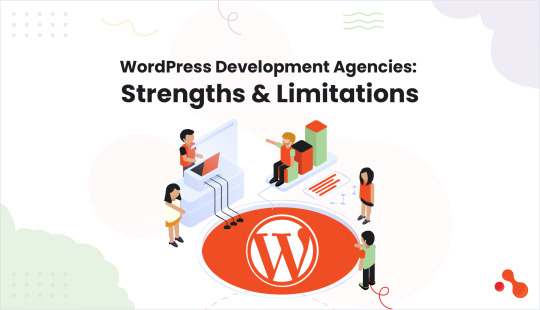
Partnering with a WordPress development agency can be a strategic move for businesses aiming for mobile-first WordPress optimization. Agencies offer a comprehensive approach, combining diverse expertise to deliver robust and scalable solutions.
Strengths
Team-Based Approach
Agencies bring together frontend and backend developers, QA testers, and SEO specialists. This collaborative environment ensures that every aspect of your WordPress site is optimized for performance and user experience.
Access to Advanced Tools and Device Labs
Agencies often have access to a wide range of devices and testing tools, enabling thorough mobile WordPress speed optimization across various platforms and screen sizes.
Reliability in Handling Complex Projects
For large-scale or intricate projects, agencies provide structured processes and project management, reducing the risk of delays and ensuring consistent quality.
Limitations
Higher Cost
The comprehensive services offered by agencies come at a premium, which may not be feasible for smaller businesses or startups.
Slower Execution Due to Structured Processes
Agencies follow established workflows, which can sometimes lead to longer timelines for project completion.
Less Flexibility for Quick Updates
Making rapid changes or updates can be challenging due to the layered approval processes within agencies.
Real-World Example
Seahawk Media is a white-label WordPress agency that has successfully partnered with over 1,000 brands, including Alibaba. They specialize in delivering high-performance WordPress websites, offering services like custom theme development, plugin integration, and site speed optimization. Their structured approach ensures consistent quality and scalability for clients.
Comparison Table: Freelancers vs Agencies for Mobile-First Performance
When planning mobile-first WordPress optimization, businesses often compare freelancers with agencies based on delivery speed, cost, and scalability. Whether you aim to hire WordPress developers or partner with WordPress experts for hire, this comparison below helps set realistic expectations for mobile-first delivery.

Freelancers may excel in mobile WordPress speed optimization when the task is niche and lightweight. However, agencies ensure a complete performance cycle from testing to deployment. It is ideal for high-traffic or growth-driven WordPress projects.
Use Case Scenarios: Who Should Choose What?

Not every project needs a large team, and not every freelancer fits long-term goals. Choosing between WordPress experts for hire and agency partnerships depends on your site's scale, timeline, and technical needs.
Freelancers can help you hire WordPress developers quickly for focused work like mobile-first styling or image optimization.
Choose Freelancers If:
You manage a small WordPress website or personal blog
Your budget is limited, and the project scope is narrow
You need quick performance fixes or one-time mobile WordPress speed optimization
You prefer direct developer communication and fast iterations
Your site doesn’t require long-term maintenance or security layers
Agencies are ideal when performance goals tie into SEO, branding, and long-term reliability.
Choose Agencies If:
You operate a high-traffic WordPress website or a growing SaaS platform
You need ongoing performance monitoring and responsive support
You want a team with QA, DevOps, and SEO working together
Your site handles sensitive user data or eCommerce transactions
You need complete mobile-first WordPress optimization, from audit to delivery
Bottomline
In a mobile-first digital landscape, performance is no longer optional now. A fast-loading, well-optimized WordPress site directly impacts traffic, SEO, and conversions.
Whether you choose an agency or go with WordPress experts for hire, your decision must align with your project’s goals. It’s not about picking the cheaper option. It’s about choosing the right fit, support, and scalability for your mobile-first needs.
Use this simple checklist to make a clear decision:
Decision Checklist
Budget: Can you afford one-time or ongoing optimization support?
Scope: Is it a small update or a full mobile-first rebuild?
Tech Needs: Do you need specialized skills like mobile WordPress speed optimization or cross-device QA?
Timeline: Do you need a quick fix or long-term performance tracking?
Support: Will you need post-launch help and scalable resources?
Choosing the right path helps you hire WordPress developers who deliver speed, structure, and stability where it matters most!
0 notes
Text
Jobs Portal Nulled Script 4.1

Download the Best Jobs Portal Nulled Script for Free Are you looking for a powerful, customizable, and free job board solution to launch your own employment platform? The Jobs Portal Nulled Script is your ideal solution. This fully-featured Laravel-based job board script offers premium functionality without the high cost. Whether you're building a local job site or a global hiring platform, this nulled script gives you everything you need—completely free. What is the Jobs Portal Nulled Script? The Jobs Portal Nulled Script is a premium Laravel-based job board application designed for businesses, HR agencies, and entrepreneurs who want to build a seamless job posting and recruitment website. The script comes packed with advanced features like employer and candidate dashboards, resume management, email notifications, location-based job search, and more—all without any licensing fees. Why Choose This Nulled Script? Unlike expensive premium plugins or themes, this Jobs Portal Nulled Script offers unmatched value. It provides a user-friendly interface, customizable design, and enterprise-level tools to make recruitment easier for both job seekers and employers. Plus, it's completely free to download from our site, allowing you to save money while building a professional job board. Technical Specifications Framework: Laravel 8+ Database: MySQL 5.7 or higher Language: PHP 7.4+ Responsive Design: Fully mobile-optimized API Ready: RESTful API endpoints available SEO Optimized: Built-in tools for on-page SEO Top Features and Benefits Employer & Candidate Dashboards: Tailored experiences for recruiters and job seekers. Smart Resume Management: Easily manage and filter resumes by job category and skills. Advanced Job Search: Location and keyword-based filtering for accurate results. Email Alerts: Automated job notifications for registered users. Payment Integration: Support for paid job postings with multiple gateways. Multi-language Support: Reach users across the globe effortlessly. Who Can Use This Script? The Jobs Portal Nulled Script is versatile and ideal for: HR agencies wanting a digital recruitment platform. Startups looking to monetize job listings or applications. Universities or colleges offering campus recruitment tools. Freelancers who want to provide job board services to clients. How to Install and Use Installing the Jobs Portal Nulled Script is straightforward: Download the script from our website. Upload the files to your server using FTP or a file manager. Create a MySQL database and import the provided SQL file. Edit the .env file to include your database credentials. Run the Laravel migration and seed commands to set up the tables. Visit yourdomain.com to start configuring your job portal! No technical expertise? No worries. The documentation provided makes it easy even for beginners to set up a complete job board system. FAQs – Frequently Asked Questions Is the Jobs Portal Nulled Script safe to use? Yes, we carefully scan and verify all files to ensure they are free of malware or backdoors. However, always install scripts in a secure environment. Can I customize the script? Absolutely. Since it’s built on Laravel, you have full control to customize routes, models, views, and controllers to fit your unique business model. Does the script support third-party integrations? Yes. You can integrate third-party services like payment gateways, newsletter tools, and analytics platforms with ease. Is it legal to use a nulled script? While we provide the script for educational and testing purposes, always ensure you comply with local software laws and licensing terms if you go live. Recommended Tools for WordPress Users If you're managing your site with WordPress, we recommend using UpdraftPlus Premium nulled for effortless backups and restoration. For search engine optimization, All in One SEO Pack Pro is a must-have tool to help your website rank faster and more effectively.
Take your online recruitment platform to the next level today. Download the Jobs Portal and build a modern, scalable, and highly effective job board without spending a dime!
0 notes
Text
Unlock the Full Potential of WordPress Development Today
Why WordPress Dominates the Web
In the constantly evolving digital world, WordPress continues to be the most trusted and versatile content management system. From personal blogs to full-fledged business platforms, it powers over 40% of all websites globally. But leveraging its full power demands more than just installing a theme. That’s where expert WordPress development services come into play—bridging the gap between a basic setup and a high-performing website that attracts, engages, and converts.

Tailored Solutions That Go Beyond Templates
Not every website is created equal. Businesses require digital solutions that reflect their unique identity and serve their specific goals. A WordPress website development agency crafts custom themes, plugins, and site structures tailored to meet these needs. Whether it’s a sleek eCommerce store, an interactive blog, or a corporate portfolio, these agencies ensure every feature and design element contributes to the brand’s voice and functionality.
Performance and Optimization: The Heart of Great Development
Speed, mobile responsiveness, and SEO-friendliness are no longer optional—they’re essential. Professional WordPress development services prioritize backend optimization, caching, image compression, and responsive design to ensure that your site loads fast and performs seamlessly across all devices. This not only improves the user experience but also significantly boosts search engine rankings.
Security That Safeguards Your Digital Presence
One of the most overlooked aspects of WordPress sites is security. Default installations are often vulnerable to attacks, especially when outdated plugins or themes are used. A competent WordPress website development agency focuses heavily on securing the site through firewall integration, malware scanning, regular updates, and strong user authentication protocols. This proactive approach prevents costly data breaches and downtime.
Scalability for Future Growth
As your business evolves, your website should too. The advantage of using custom WordPress development services lies in the scalability they offer. These services are structured to accommodate future growth—whether it's through adding advanced features, expanding product lines, or increasing traffic volumes. This future-ready mindset ensures your website never becomes a limitation.
E-Commerce Integration for Seamless Sales
If selling products or services online is part of your business model, WordPress has powerful tools like WooCommerce to support it. A skilled WordPress website development agency can build a user-friendly, secure, and conversion-optimized online store. From product page design to cart functionality and payment gateway integration, every aspect is handled with precision to deliver an outstanding customer experience.
Reliable Support and Maintenance
The job doesn’t end once the website goes live. Like any tech platform, WordPress needs continuous updates, bug fixes, and performance tuning. Reliable WordPress development services offer ongoing maintenance packages, ensuring your site remains current, secure, and functional. This peace of mind allows business owners to focus on their operations without worrying about technical glitches.
Real Results Through Strategic Development
The ultimate goal of hiring a WordPress website development agency is to drive real business outcomes—be it increased traffic, better lead generation, or higher sales conversions. These agencies don’t just code; they think strategically. They analyze target audiences, study competitors, and design user journeys that lead visitors through the sales funnel with clarity and ease.
Conclusion: Elevate Your Brand with Trusted Expertise
Partnering with the right development team can redefine your online presence and accelerate your business growth. Whether you're building from scratch or upgrading an existing site, expert hands make all the difference. For scalable, secure, and results-driven websites, uptechsol.net stands out as a reliable partner delivering excellence through professional WordPress development services and expertise as a top-tier WordPress website development agency.
0 notes
Text
Custom WordPress Website Solutions for Your Business Growth
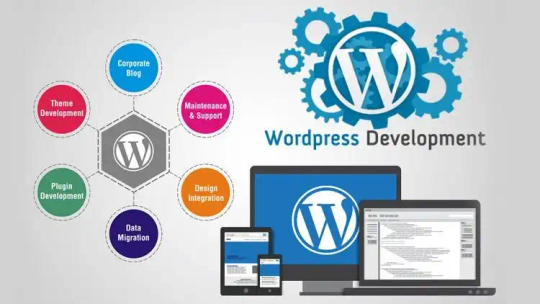
In today’s digital world, having a unique and efficient website is crucial for business success. Many companies turn to WordPress, a powerful platform, for building their websites. However, a generic site won’t always cut it. That’s where custom WordPress website solutions come into play. Tailoring your site to your brand, audience, and goals can dramatically improve engagement and conversions.
Why Choose Custom WordPress Website Solutions?
WordPress is popular because it’s flexible, user-friendly, and scalable. Still, off-the-shelf themes and plugins may limit your site’s potential. Custom WordPress web give you full control over design, functionality, and user experience. This approach ensures your website aligns perfectly with your business objectives and stands out from competitors.
Benefits of Custom WordPress Website Solutions
Unique Brand Identity A custom design reflects your brand’s personality better than generic templates. It helps create a memorable experience for visitors.
Better Performance and Speed Custom coding removes unnecessary bloat, optimizing your site to load faster and run smoother.
Enhanced Security Tailored solutions allow for stronger security measures, protecting your site from common WordPress vulnerabilities.
Improved SEO Custom WordPress website allow you to structure your site and content to maximise search engine rankings.
Scalability As your business grows, your website can easily adapt without needing a complete overhaul.
Key Elements of Custom WordPress Website Solutions
Bespoke Design: Unique layouts and user interface tailored to your needs.
Custom Plugins and Features: Specific functionalities that suit your business model.
Mobile Responsiveness: Ensuring your site looks and works great on all devices.
Integration with Third-Party Tools: CRM, payment gateways, marketing platforms, and more.
Ongoing Support and Maintenance: Keeping your site updated, secure, and functional.
The Development Process
Creating custom WordPress website typically involves these steps:
Discovery & Planning: Understanding your goals and audience.
Design: Wireframing and creating mockups.
Development: Building the site with clean, efficient code.
Testing: Ensuring compatibility, performance, and bug-free experience.
Launch & Support: Deploying your site and providing ongoing help.
Common Use Cases for Custom WordPress Solutions
E-commerce stores needing tailored shopping experiences.
Service businesses requiring appointment booking and lead capture.
Educational institutions looking for custom course management.
Bloggers and influencers who want unique content presentation.
Non-profits aiming for engaging donation systems.
Choosing the Right Developer for Custom WordPress Solutions
It’s important to pick a developer or agency with proven experience in WordPress customisation. Look for a partner who:
Understands your industry.
Can show a portfolio of customised WordPress projects.
Offers clear communication and ongoing support.
Stays updated with WordPress trends and security standards.
Conclusion
Custom WordPress solutions are a smart investment for businesses looking to make a mark online. They combine flexibility, security, and performance to deliver a website that truly represents your brand and meets your unique needs. Don’t settle for generic — go custom and watch your business grow.
0 notes
Text
Why Is GB Consulting the Ideal WordPress Theme for Coaches and Consultants?
Whether you're a business coach, marketing advisor, or financial strategist, your website is often the first impression clients have of your expertise. That’s why choosing the right theme matters.
GB Consulting is a sleek and modern WordPress theme for online consultants that helps you present your services professionally and generate qualified leads with ease.
Built for High-Converting Consulting Websites
A good consulting website should not just inform—it should convert. GB Consulting uses a results-driven layout that includes:
Call-to-action banners
Service overview blocks
Testimonial sliders
Integrated booking/contact forms
These components make it easier for potential clients to trust you and take action.
Customization Made Simple
This theme works beautifully with drag-and-drop builders like Elementor, giving you total visual control. Adjust layouts, update text, and swap images—all without coding.
You’ll also get access to:
Pre-designed homepage and inner page templates
Custom header and footer options
Multiple typography and color scheme settings
Whether you’re building your first site or refreshing an old one, the intuitive interface streamlines the process.
Fast, Responsive, and SEO-Optimized
Speed and usability aren’t optional—they’re critical. GB Consulting is lightweight and coded for performance, with mobile optimization baked in.
Other SEO-friendly features include:
Structured data for search engines
Compatibility with Yoast and Rank Math
Clean URL structure and meta optimization
Fast loading times for better rankings and UX
With this SEO-optimized consulting WordPress theme, your site will rank higher and perform better on all devices.
Feature-Rich for Service-Based Businesses
This theme isn’t just beautiful—it’s functional. GB Consulting includes essential tools that every consultant or agency needs:
Appointment booking plugins
Email opt-in forms
Downloadable resources (PDFs, guides, etc.)
Pricing tables and comparison blocks
This helps you automate client acquisition and deliver a more professional digital experience.
Blog to Share Thought Leadership
Positioning yourself as an expert is key in the consulting world. GB Consulting includes a clean, distraction-free blog layout so you can:
Publish articles or insights
Share news or updates
Highlight speaking engagements or webinars
A well-maintained blog attracts traffic and keeps visitors engaged—essential for organic growth.
WooCommerce and Payment Integration
Want to monetize your services online? GB Consulting supports WooCommerce so you can:
Sell consulting packages
Charge for webinars or workshops
Accept deposits for retainers or projects
This makes it a full-featured online consulting WordPress template that supports scalable business models.
Built for Solo Consultants and Agencies
Whether you're a solo coach or part of a larger consultancy, this theme is designed to grow with your business. It supports:
Multiple team member profiles
Portfolio and case study pages
Multilingual content
Advanced navigation and mega menus
You can present your entire team or streamline it to focus solely on your personal brand.
Conclusion
If you’re in the consulting or coaching space, having a website that works as hard as you do is critical. GB Consulting – Online Consulting WordPress Theme is the perfect blend of form and function—helping you attract leads, build trust, and grow your business online.
Don’t settle for generic themes—choose one that’s built for your niche, with the tools to convert visitors into clients.
#online consulting WordPress theme#virtual consulting website theme#consultancy agency WordPress template#online advisor WordPress theme#business consulting website#digital consultant WordPress template#virtual coach WordPress theme#remote consulting WordPress theme#professional consulting WordPress site#online business advisory theme#consulting portfolio WordPress template#strategic consulting WordPress theme#online expert WordPress theme#consulting services website template#virtual strategy coach WordPress#IT consulting WordPress theme#online marketing consultant template#digital solutions WordPress theme#virtual assistant WordPress website#business mentor WordPress template
0 notes
Text
A Practical Guide to Ecommerce Development: WordPress, Shopify, and Choosing the Right Services
Digital commerce has become essential for businesses of all sizes. Whether starting small or managing a growing catalog of products, having a reliable, scalable, and easy-to-manage ecommerce setup is critical. But with multiple platforms and service models available, selecting the right path can be challenging.
This article explores three key areas of focus in the ecommerce space: ecommerce development services, WordPress development services, and the value of working with a Shopify development agency. Understanding the strengths, limitations, and suitable use cases for each helps businesses make decisions based on actual needs—not trends.
What Do Ecommerce Development Services Include?
Ecommerce development services refer to the technical planning, construction, and support of an online store. This includes setting up platforms like WooCommerce or Shopify, configuring product categories, managing payment gateways, and ensuring mobile responsiveness.
Core Components of Ecommerce Development
Platform Setup Depending on the product range and business model, developers set up platforms such as WordPress, Shopify, or Magento.
Design and User Interface A structured layout, easy navigation, and responsive design improve the overall user experience and conversion rates.
Product and Inventory Management Services often include integration with inventory systems, setting up variants, attributes, and real-time stock tracking.
Payment and Checkout Integration Secure, smooth payment gateways and easy checkout experiences reduce cart abandonment.
Shipping Configuration Ecommerce services also include linking with logistics providers, calculating real-time rates, and handling multi-location shipping needs.
Analytics and Tracking Integration with Google Analytics or custom dashboards provides data on sales performance and customer behavior.
Security and Maintenance SSL setup, regular updates, and monitoring ensure the site remains safe and operational at all times.
Who Needs These Services?
From first-time store owners to established retailers looking to scale, ecommerce development services are useful for businesses that:
Want to build a new store from scratch
Need to migrate platforms
Plan to customize existing functionality
Require integration with third-party apps or internal systems
WordPress Development Services for Ecommerce
WordPress is widely known as a content management system, but with the WooCommerce plugin, it also serves as a full-fledged ecommerce platform. Its open-source structure and wide plugin ecosystem make it a flexible option for businesses with specific design or content needs.
What WordPress Development Services Typically Cover
WooCommerce Setup Installation, configuration, and customization of the WooCommerce plugin to manage products, payments, and shipping.
Custom Theme Development Creating themes from scratch or modifying existing ones to align with business identity and layout requirements.
Plugin Integration Extending functionality using plugins for SEO, customer support, analytics, and more.
Site Performance Optimization Image compression, caching tools, and lazy loading for faster page loads.
Security and Backup Adding security plugins, SSL setup, and backup scheduling to keep the site protected.
Content Structure Managing posts, pages, and taxonomy to ensure consistent user experience across blog and product areas.
Advantages of Using WordPress for Ecommerce
Flexibility: Offers full control over design and backend code
Community Support: Thousands of themes, plugins, and developer communities
Cost Control: Hosting and development can be scaled based on budget
Content Focused: Ideal for businesses that balance ecommerce with content (e.g., magazines with online shops)
Points to Consider
Requires separate hosting
Maintenance and updates are manual or plugin-dependent
Some technical learning required if managed in-house
Businesses that need a blend of content management and product selling—especially with multiple product types or frequent blog updates—often choose WordPress development services.
The Role of a Shopify Development Agency
Shopify is a hosted ecommerce platform focused entirely on product-based selling. With built-in hosting, security, and user-friendly tools, it’s often preferred by businesses that want a fast setup and minimal technical maintenance.
A Shopify development agency specializes in creating, customizing, and managing Shopify stores to meet the specific needs of clients.
Typical Services Offered by a Shopify Development Agency
Store Setup Product import, category organization, and basic Shopify configuration.
Theme Customization Modifying existing themes or creating custom ones using Liquid, Shopify’s templating language.
App Integration Connecting third-party apps for reviews, loyalty programs, subscriptions, or advanced analytics.
Custom Functionality Adding advanced features such as dynamic pricing, multi-location inventory, or product bundling.
Store Migration Transferring existing stores from platforms like WooCommerce, Magento, or Wix to Shopify without losing data or SEO ranking.
Ongoing Support Updates, bug fixes, UX improvements, and data reporting.
When to Choose Shopify
Quick launch timelines
Limited technical resources in-house
Need for scalable infrastructure without hosting concerns
Preference for predictable monthly costs
Focused solely on product selling (vs. content or membership sites)
For small to mid-sized businesses, or those scaling rapidly, working with a Shopify development agency ensures the store remains optimized, fast, and user-friendly.
Choosing the Right Development Partner
Whether selecting a freelancer, an internal team, or an external agency, the development partner should:
Understand your business model and growth plans
Recommend a platform based on actual requirements
Provide transparent timelines and deliverables
Offer post-launch support and performance monitoring
Be experienced in working with the platform of your choice
A balanced approach between strategy, execution, and support ensures long-term results. One such provider that handles both ecommerce development services and platform-specific solutions is webiators, known for working across WordPress and Shopify environments.
Final Thoughts
Building an ecommerce presence requires more than a platform—it requires a structure that supports long-term goals, adapts to growth, and delivers consistent performance. Whether through WordPress development services for full control, or a Shopify development agency for speed and scalability, choosing the right approach comes down to understanding your current needs and future direction.
Development services help translate business ideas into digital storefronts that not only work but grow with you—one order, one customer, and one update at a time.
0 notes
Text
10 Best Startup Agency WordPress Themes You Must Know About
Techto– Ideal for tech startups, compatible with WPBakery and Elementor.
Lumi – Offers pixel-perfect, contemporary layouts for various business types.
Sydney Pro – A professional theme with 17 pre-built website designs.
Divi – A highly customizable theme with a drag-and-drop builder.
Astra – Lightweight and fast, with extensive customization options.
Neve – A mobile-first theme with a minimalist design.
Kalium – A creative theme with multiple portfolio layouts.
Bridge – A multipurpose theme with over 500 demos.
Avada – One of the best-selling WordPress themes with flexible design options.
Each of these themes offers unique features tailored to different startup needs. If you're looking for a theme that fits your business model, you can explore more details here, here, and here. Let me know if you need help choosing the right one!
#premium wordpress themes#wordpress premium themes#consulting business wordpress theme#premium wordpress theme#paid wordpress themes
0 notes
Text
Empower Proven Growth with Top Wordpress SEO Company Experts
In the ever-evolving world of digital marketing, a website built on WordPress requires a specialized approach to search engine optimization. As algorithms become more sophisticated, technical precision and content relevance are non‐negotiable for ranking success. Partnering with a Wordpress SEO Company empowers businesses to navigate complex SEO landscapes while focusing on core operations. From technical audits to content strategies, a comprehensive optimization plan ensures consistent organic traffic growth and enhanced user experience.
Why Specialized WordPress SEO Matters
WordPress powers a significant portion of the web, making competition for first‐page rankings intense. A tailored strategy addresses platform-specific factors such as theme performance, plugin compatibility, and database efficiency. By engaging a Wordpress SEO Agency, site owners gain access to expertise in Core Web Vitals, schema markup, and mobile-first indexing. This level of specialization not only improves load speeds and crawlability but also positions content for rich results and featured snippets. A dedicated approach to WordPress SEO eliminates generic tactics that often overlook platform nuances, delivering measurable improvements in visibility and engagement.
Core Components of a Robust SEO Plan
Effective WordPress SEO begins with a thorough technical audit. This audit uncovers issues like broken links, redirect chains, and incorrect schema implementation. Next, in-depth keyword research tailored to your niche aligns content with user intent and emerging search trends. Whether aiming to capture voice-search queries or long-tail informational searches, strategic keyword placement within headings, meta tags, and body content is vital. When you choose an SEO Company for Wordpress, you benefit from data-driven insights that guide content hierarchy, internal linking structures, and metadata optimization. Complementing on-page efforts with image compression, caching strategies, and CDN integration further boosts performance metrics and user satisfaction.

Advanced Tactics for Sustained Authority
Beyond foundational optimizations, advanced strategies cement long-term authority and trust. Building a high-quality backlink profile through guest posting, digital PR, and strategic partnerships signals credibility to search engines. Regular content audits ensure outdated or underperforming pages are refreshed, merged, or removed to maintain a lean, authoritative site architecture. A seasoned Wordpress SEO Company often incorporates A/B testing, heat mapping, and user behavior analysis to refine UX and conversion pathways. By continuously monitoring algorithm updates and industry shifts, a proactive Wordpress SEO Agency adapts tactics—such as semantic topic modeling and entity optimization—to stay ahead of competitors and algorithm changes.
Measuring Success and Driving Growth
Ongoing performance tracking is essential for validating ROI and identifying new opportunities. Detailed reports on keyword rankings, organic traffic trends, and engagement metrics allow for agile strategy adjustments. Integrating analytics dashboards with custom alerts ensures that technical errors or traffic fluctuations are addressed immediately. A reliable SEO Company for Wordpress provides transparent reporting and collaborates on goal setting, whether targeting local search dominance or international market expansion. This partnership model fosters sustained growth, as iterative improvements compound over time.
Get Started with Expert WordPress SEO
Embracing a full‐service WordPress SEO solution positions your site to outperform competitors and capture valuable organic traffic. From meticulous technical audits to authoritative content strategies and high-impact link building, the right team makes all the difference. Reach out to a Wordpress SEO Agency today to discuss a customized roadmap. With expert guidance, you can capitalize on platform-specific best practices and secure lasting search visibility. Investing in professional optimization is not just about rankings—it’s about creating a seamless user experience that drives conversions and business growth.
Source URL:
0 notes
Text
WordPress Accessibility Guide 2025: Practical Tools and Compliance Essentials
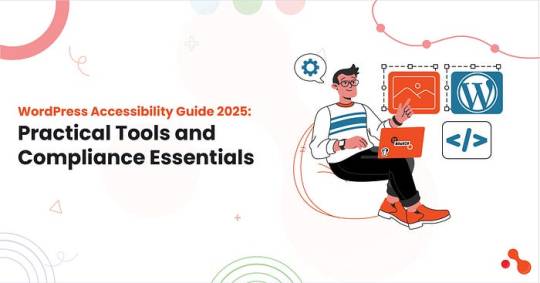
Let’s face it, WordPress accessibility guide 2025 isn’t just a checklist for developers anymore. It’s about real users having real trouble using your website if it’s not inclusive. You must plan to hire a remote WordPress developer to make sure your project defines all the benchmarks of today’s digital trends!
Millions of people browse the web with screen readers, keyboard navigation, or color-adjusted screens. If your WordPress site doesn’t support them, you’re losing traffic and trust, maybe even risking legal action.
This guide will walk you through the basics of making your WordPress site more accessible. From smart plugin picks to WordPress ADA compliance solutions, and tips on testing, we’ve packed it all in!
Starting First! Understanding WordPress Accessibility
What Is Website Accessibility?
For instance, a user relying on a screen reader must be able to navigate your blog post just as easily as someone scrolling with a mouse. In WordPress, it covers alt text for images, keyboard-friendly navigation, color contrast, readable fonts, form labels, and ARIA roles.
With over 1.3 billion people worldwide living with some form of disability (WHO), ensuring your site is inclusive is a strategic move. For e-commerce sites, blogs, or SaaS platforms built on WordPress, ignoring accessibility means excluding millions of potential users. A worthy WordPress website development company can help you achieve the mark of being highly accessible!
Key Accessibility Principles: The POUR Model
To make WordPress accessibility practical, the POUR framework serves as your foundation:
1. Perceivable
Users must be able to detect all UI elements, text, images, audio, and video. That means:
Use alt tags for every image.
Offer transcripts or captions for multimedia.
Avoid color-only indicators (e.g., don’t use red text to show errors alone).
2. Operable
Your site must work for users who:
Navigate via keyboard (tab, shift-tab, enter).
Use adaptive tools like screen readers or eye-tracking software.
Need sufficient time to complete actions like filling out forms.
3. Understandable
Structure your site with clear navigation and stick to common design conventions. Ensure error messages are easy to spot and correct. For example:
Use consistent layouts across all pages.
Label buttons with clear actions (“Submit,” not “Go”).
Avoid technical jargon or complex phrases.
4. Robust
Accessible content must remain valid as browsers and assistive technologies evolve. That means:
Valid HTML5 structure.
ARIA roles were necessary.
Regular plugin/theme updates to prevent breakages.
The Impact of Accessibility on UX, SEO, and Trust
User Experience
From font scaling to contrast adjustments, inclusive design equals a better experience for everyone. On mobile devices, these principles are even more vital.
SEO Rankings
Google’s Core Web Vitals intersect with many accessibility standards. Optimizing for accessibility often boosts SEO naturally.
Alt text = better image SEO.
Clean markup = faster indexing.
Descriptive links and headers = clearer site structure.
Brand Trust and Legal Safety
In the US alone, ADA lawsuits for inaccessible websites rose 12% in 2024. If your WordPress site isn’t accessible, you risk both revenue and legal penalties. If you’re offering WordPress development services, accessibility should be part of your pitch.
Important Accessibility Standards You Must Know (2025 Update)
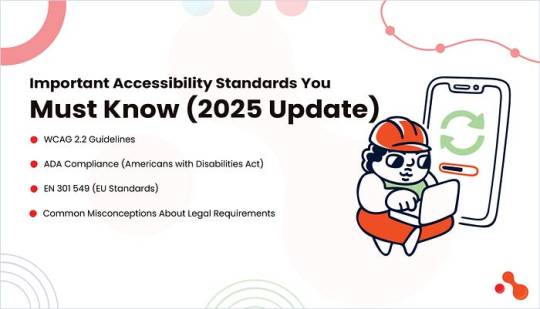
Whether you’re a developer, agency, or business owner, staying compliant with recognized accessibility standards is critical for any WordPress website. Let’s walk through the three major standards that directly impact your WordPress ADA compliance solutions and clear up the most common legal myths around them.
WCAG 2.2 Guidelines
The Web Content Accessibility Guidelines (WCAG) form the backbone of global web accessibility. The latest version, WCAG 2.2, builds on earlier guidelines and introduces refinements focused on mobile usability and cognitive impairments.
Key criteria in WCAG 2.2:
Focus appearance: Ensures users can see where they are navigating via keyboard.
Dragging movements: Replaces drag-and-drop with tap alternatives.
Consistent help: Guarantees help content is persistent on every page.
These standards categorize compliance into three levels:
A: Basic accessibility.
AA: Recommended for public-facing websites.
AAA: Advanced and often not fully achievable.
For anyone offering WordPress development services, achieving at least Level AA compliance should be non-negotiable. Most of the best WordPress accessibility plugins 2025 are designed specifically to meet these WCAG criteria.
ADA Compliance (Americans with Disabilities Act)
The ADA Title III requires that digital platforms be accessible to users with disabilities. Although the law does not explicitly name WCAG, most legal experts and courts reference WCAG 2.1 AA or 2.2 AA as the standard benchmark in litigation.
Lawsuits have surged over the last few years. Over 4,500 ADA lawsuits were filed in the U.S. in 2024 for digital inaccessibility. If you run a business website and serve U.S. customers, your site needs to meet ADA standards, especially if you offer services or sell products online.
EN 301 549 (EU Standards)
For European businesses or any site serving EU users, EN 301 549 is the standard enforced under the European Accessibility Act. It mandates accessibility for public sector websites, mobile applications, and increasingly for private entities in 2025. If you rely on WordPress ADA compliance solutions, make sure you understand the legal scope these tools claim to cover!
EN 301 549 directly references WCAG guidelines, but also includes:
Hardware and software interoperability
Assistive technology integration
Real-time text communication standards
Whether you choose to hire a WordPress plugin developer or agency, ensure they consider these regional requirements when customizing functionality:
Common Misconceptions About Legal Requirements
Many site owners and developers fall into traps due to misinformation. Let’s clear a few things up:
My site isn’t for government or healthcare, so I’m exempt.
Wrong. ADA applies to all public-facing websites in the U.S. with commercial offerings.
I installed a plugin, so I’m compliant.
Plugins help, but they don’t guarantee full compliance. Manual audits and developer input are essential.
No one will sue a small business.
Wrong again. Most lawsuits target small to mid-sized businesses because they often lack compliance knowledge or legal defense.
Accessibility is a one-time fix.
Accessibility is an ongoing process. Every theme update, plugin installation, or content change can affect it.
Top WordPress Accessibility Plugins to Use in 2025

While plugins can’t do everything, they serve as an essential layer in your WordPress ADA compliance solutions. Combining them with help from a WordPress website development company or hiring a WordPress plugin developer can help you build and maintain accessibility the right way!
Below is a curated list of the best WordPress accessibility plugins for 2025:
One Click Accessibility
Perfect for beginners, this plugin adds accessibility features like skip links, font resizing, and contrast toggles with a single install. Lightweight and fast.
Best for: Small business sites and blogs looking for quick WCAG wins.
WP Accessibility Helper (WAH)
A more advanced plugin that offers contrast adjustment, font controls, and ARIA landmarks. It includes WCAG checklists and paid options for detailed audits.
Best for: Developers and agencies managing multiple accessibility points.
UserWay Accessibility Widget
This cloud-based tool adds an accessibility widget that users can toggle. It covers contrast, font size, and screen reader adjustments.
Best for: Public-facing websites needing on-screen control options.
AccessiBe
One of the most widely used WordPress ADA compliance solutions, AccessiBe, uses AI to scan and apply accessibility fixes dynamically. It’s fully managed, but premium-only.
Best for: Businesses facing legal risk or needing full automation and audits.
WP ADA Compliance Check Basic
Audits your site and flags compliance issues. Ideal for spotting image alt text issues, missing labels, and structural HTML problems.
Best for: Developers needing fast compliance diagnostics.
Accessibility by UserWay
Similar to the UserWay Widget but with more configuration and branding controls. Integrates with screen readers and is WCAG 2.1-compliant.
Best for: Agencies and developers looking to white-label their accessibility efforts.
Let’s understand this more with this quick comparison table:
Plugin Comparison Table: Free vs Paid Features (2025)
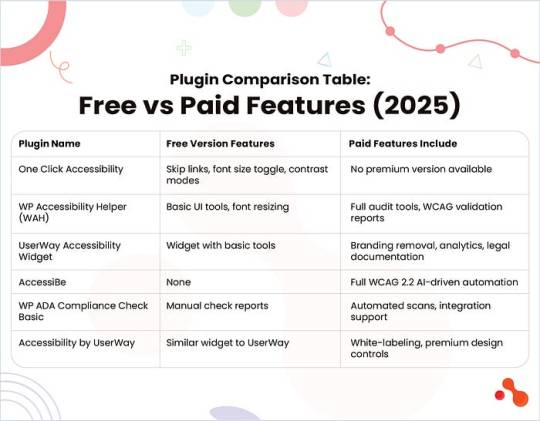
Best Practices to Build an Accessible WordPress Site

These tips align with the latest guidelines from the WordPress accessibility guide 2025 and help you deliver real accessibility value to all users.
Use Correct HTML Semantic Markup
Always structure your site using <header>, <nav>, <main>, <section>, and <footer> tags properly. Use heading levels (<h1> to <h6>) in a logical order. Screen readers rely on this hierarchy to make sense of the page.
Ensure Color Contrast Ratios
Poor contrast affects readability for users with low vision. Follow WCAG 2.2 recommendations: 4.5:1 contrast ratio for normal text and 3:1 for large text. Use tools like WebAIM Contrast Checker to evaluate your color palette.
Add Alt Text to All Images
Descriptive alt text helps screen readers convey image context. Avoid using vague descriptions like “image” or “picture.” When using decorative images, add an empty alt=”” tag to skip unnecessary narration.
Enable Keyboard Navigation
Users with mobility impairments often rely on keyboards. Make sure all elements, menus, buttons, and forms are focusable using the Tab and Enter keys. Avoid JavaScript-only interactions that block keyboard access.
Support Screen Readers
Use ARIA roles and landmarks thoughtfully. Ensure live regions, modals, and dynamic content updates are properly announced. Test using tools like NVDA or VoiceOver to confirm your site works with real screen readers.
Avoid Auto-Playing Media
Videos or audio that play automatically can disorient users. If you must include auto-play content, provide clear pause and volume controls. This is critical for compliance under WordPress ADA compliance solutions.
Create Accessible Forms
Label every input clearly and consistently. Use <label> tags tied to their corresponding fields using the for attribute. Include helpful error messages and confirm button states that are easy to understand for users with screen readers or visual challenges.
How to Test Your WordPress Site for Accessibility?
Building an accessible site is just the beginning. You must test and audit it regularly to make sure it’s truly usable for everyone.
Here’s how you can test your WordPress site the right way!
Manual Testing Tips
Manual testing reveals issues that tools often miss. Try these steps:
Keyboard-Only Navigation: Can you navigate through all menus, forms, and links using only the Tab, Shift+Tab, and Enter keys? If not, users with mobility challenges may face barriers.
Screen Reader Simulation: Use screen readers like NVDA (Windows) or VoiceOver (macOS) to simulate how visually impaired users interact with your site. Listen for proper heading flow, button labeling, and announcements for dynamic content.
Form Accessibility Check: Test all form fields and validation states. Confirm if users receive clear error messages and can complete forms using assistive tech.
Automated Tools

Regular Audits and User Testing
Schedule monthly or quarterly audits using both tools and human testers, especially if your site updates frequently. You can involve users with disabilities in your testing cycle. Their feedback will help uncover edge cases and improve real-world usability beyond plugin coverage.
Common Accessibility Mistakes to Avoid
Even with the best plugins and tools, small mistakes can ruin the user experience. The WordPress accessibility guide 2025 points out that many site owners rely too heavily on automation or overlook mobile usability, two things that can break compliance.
Here’s what to avoid:
Relying Only on Plugins Without Manual Review
Plugins are helpful, but they aren’t perfect. They won’t catch incorrect heading structures, misleading link text, or poorly labeled form fields. For example, a plugin might not flag a CTA that says “Click Here” with no context. Always pair plugins with manual reviews and expert insight.
Ignoring Mobile Accessibility
Accessibility must extend beyond desktops. On mobile, buttons that are too small or layouts that shift can make navigation frustrating. Users who rely on screen magnifiers or touch navigation need a layout that adjusts with clarity and predictability.
Overusing Popups and Animations
Auto-triggered popups or moving elements can disorient users with cognitive disabilities. Flashing banners or background animations may also trigger seizures in sensitive users. Always offer ways to pause or disable motion.
Assuming Accessibility is a “One-Time” Project
Accessibility is a continuous process. New content, plugins, or theme updates can break previously compliant elements. Just because your site passed a test last year doesn’t mean it’s still accessible today.
Tip: Hire a WordPress plugin developer who ensures long-term compliance with each change or feature rollout!
Benefits of an Accessible WordPress Site
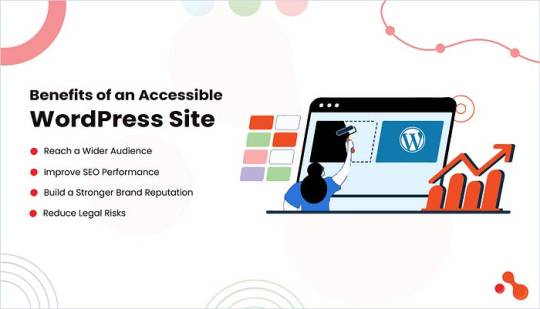
Following the WordPress accessibility guide, 2025 is a growth opportunity. An inclusive website doesn’t just help people with disabilities. It helps your brand grow faster, rank higher, and stay safer from legal trouble.
Reach a Wider Audience
More than 1.3 billion people globally live with some form of disability, which is over 15% of the population. By making your site accessible, you unlock a huge segment of users who are often excluded from digital experiences. Whether it’s visual impairments, motor limitations, or cognitive challenges, accessibility ensures every visitor can use your site.
Improve SEO Performance
Google’s algorithm rewards accessibility. Features like proper HTML structure, alt tags, ARIA roles, and keyboard navigation all improve crawlability and user experience, core factors in ranking. Many WordPress ADA compliance solutions align closely with technical SEO best practices, so improving one boosts the other naturally.
Build a Stronger Brand Reputation
In 2025, consumers value inclusivity. Accessibility sends a clear message: your brand cares about all users. It improves customer loyalty and adds weight to your ESG and DEI positioning. Startups and enterprises alike are now embedding accessibility into their development roadmap.
Reduce Legal Risks
In the U.S., the number of ADA lawsuits related to inaccessible websites has grown steadily. Internationally, laws like the European Accessibility Act are enforcing stricter standards. A non-compliant website can lead to fines, lawsuits, or even takedown orders. Staying compliant with the latest WordPress ADA compliance solutions reduces this risk and keeps your business legally safe.
Bottomline
As the WordPress accessibility guide 2025 has shown, relying solely on plugins won’t guarantee a fully accessible or legally compliant experience. Tools like WP ADA Compliance Check Basic or One Click Accessibility speed up your workflow, but the real value lies in aligning your site with WCAG 2.2, ADA guidelines, and global standards like EN 301 549.
0 notes